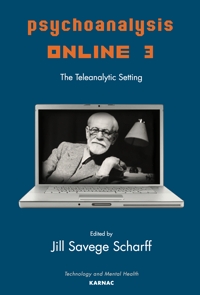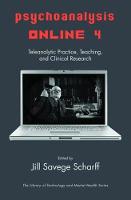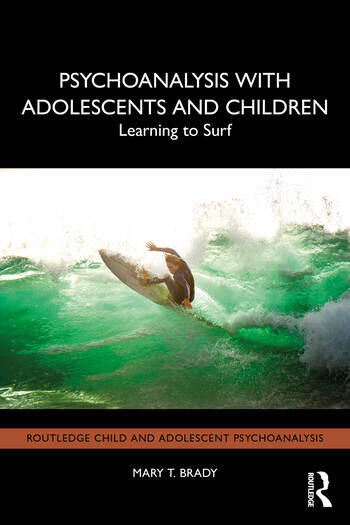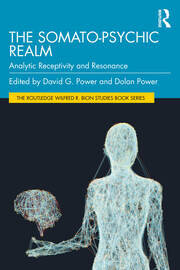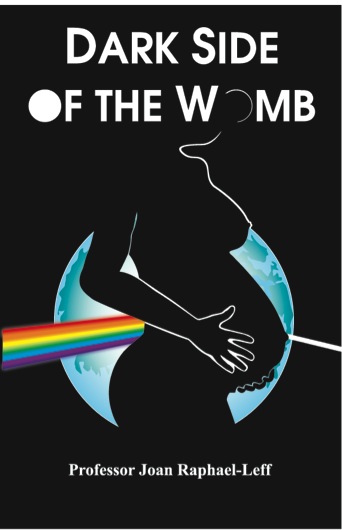An Introduction to Child and Adolescent Psychoanalytic Psychotherapy
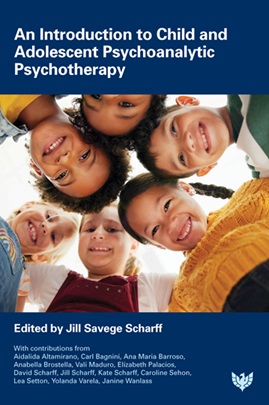
Book Details
- Publisher : Karnac Books
- Published : November 2024
- Cover : Paperback
- Pages : 404
- Category :
Psychoanalysis - Category 2 :
Child and Adolescent Studies - Catalogue No : 97852
- ISBN 13 : 9781800132818
- ISBN 10 : 1800132816
Also by Jill Savege Scharff
Psychoanalysis Online 3: The Teleanalytic Setting
Price £34.99
The Primer of Object Relations: Second Edition
Price £44.00
Our Customers Average Rating
Read all reviews (1)





This book presents and illustrates the theory and technique of working with young people, their parents, and their families. Wide-ranging in focus from individuals to communities, it gives a comprehensive review of the symptoms and causes of disorder in young people and a sensitive approach to deepening the treatment of children and adolescents.
With contributions from Aidalida Altamirano, Carl Bagnini, Ana Maria Barroso, Anabella Brostella, Vali Maduro, Elizabeth Palacios, David Scharff, Jill Savege Scharff, Kate Scharff, Caroline Sehon, Lea Setton, Yolanda Varela, and Janine Wanlass.
An Introduction to Child and Adolescent Psychoanalytic Psychotherapy is for adult and child therapists who want to learn about treating children and adolescents from a psychoanalytic perspective. It is a comprehensive introduction to provide adult psychoanalytic therapists with enough information and support to take up the challenge of beginning child and adolescent psychotherapy and to give CBT and sand play therapists access to a psychoanalytic perspective on work with young people. It grew from lectures and discussions with therapists over the course of a two-year training program, covering theory and technique of assessment and therapy, play, ethics, and work with parents. The contributors show how to deal with the common symptom presentations, how to establish a relationship, deal with resistance, engage in play, and interpret unconscious conflict. Included are clinical case conferences and consultations, and North and Central American, European, and Chinese clinical examples provide global relevance. This edited book is a group effort that presents a compendium of basic principles of practice and has a grounding in ethics and research, child and adolescent development, psychoanalytic theory of childhood, wellness and psychopathology of childhood, treatment technique, and consulting in the community to schools, agencies, and family court.
This is a must-read book for all professionals engaged in working with children and adolescents, and for psychotherapists who would like to learn more about working with young people from a psychoanalytic perspective.
Reviews and Endorsements
‘Under the editorship of Jill Scharff, a group of excellent IPI psychoanalysts have created a timely, essential, and outstanding textbook of psychotherapy for use by all training bodies for professionals needing to understand children in a more in-depth manner. I was impressed by the comprehensive topics regarding children from infancy through late adolescence. This vast range of topics will enable professionals to comprehend, explore with children, and find ways of sensitively helping them relinquish impediments to their development and establish trustworthy relationships in which they can integrate aspects of their personality and build a competent and confident authentic self. The importance of creating a community of multidisciplinary concern through collaborative work between teachers, parents, and psychotherapists is also highlighted. Experienced clinicians will find that this book deepens their capacity to teach and be present for children, their parents, and trainees learning to work effectively with children and adolescents.’
Dr Jeanne Magagna, Tavistock-trained Child, Adult, and Family Psychotherapist
‘Jill Scharff has given us a gift, one to those who are learning about child analysis, or yearning for a review, or just interested in the field. She and her international colleagues offer a framework to not only think about child analysis, but to teach it. Thus, it is a gift for us all. They provide a comprehensive overview of the basic principles of child analytic practice grounded in ethics, research, development, psychoanalytic theory, and technique. Included are the importance of considering cultural influences, the environment in which a child lives, in addition to the conscious and unconscious worlds of the therapist and the child. I highly recommend this book for the next generation of child psychotherapists and those who are dedicated to bringing them along – I loved reading it!’
Jill M. Miller, PhD, Faculty and Training Analyst, Washington Baltimore Center for Psychoanalysis; Child and Adolescent Supervisor, various US Institutes; Co-editor-in-Chief, The Psychoanalytic Study of the Child
‘This is no ordinary “Introduction” to the practice of child and adolescent psychoanalytic psychotherapy. It follows an exceedingly well-thought-out plan, while providing a carefully integrated collection of concise and detailed chapters – a compendium – on development, assessment, and psychodynamic ways of understanding symptoms, treatment, work with parents, and carefully selected psychoanalytic theoretical points of view. Jill Scharff and her colleagues also bring in multinational, cultural, and ethical considerations along with rich clinical illustrations and examples of work in the community. It’s a masterfully done text by master teachers and clinicians that is sure to become a welcome resource for learners and teachers alike.’
Denia G. Barrett, MSW, Co-editor, The Psychoanalytic Study of the Child; Co-editor, Parentwork Casebook; past President, Association for Child Psychoanalysis
‘This extraordinary compendium offers both students and teachers of child psychotherapy a rich and eclectic survey of theory, practice, and technique with different age groups and populations. Read straight through as a textbook, or dipped into for insight about specific problems or situations, it delivers helpful and informed descriptions of all the different ways we can think about helping children and families move forward in their development. A great resource!’
Kerry Kelly Novick, Life-cycle Psychoanalyst; co-author, Working With Parents Makes Therapy Work, Freedom To Choose, and Good Goodbyes
Table of Contents
List of figures and tables
Preface and acknowledgements
About the editor and contributors
Part 1: Introduction: context and stance for the child psychotherapist?
Orientation to play and psychoanalytic child and family assessment and therapy
- Carl Bagnini, Anabella Brostella, David Scharff, and Jill Savege Scharff
The ethical stance in child psychotherapy
- Caroline Sehon
Finding cultural humility
- Janine Wanlass
The research basis for psychoanalytic child therapy
- Janine Wanlass
Learning from process notes
- Janine Wanlass
Part 2: Child and adolescent development
The beginning of life
- Jill Savege Scharff
Classical psychosexual and psychosocial theories of child development
- Jill Savege Scharff
Infancy: The oral phase
- Anabella Brostella
Toddlerhood: The anal stage
- Anabella Brostella
Preschool age: The phallic–narcissistic stage
- Jill Savege Scharff
Kindergarten age: The oedipal stage
- Caroline Sehon
Elementary school age: latency
- Ana Maria Barroso and Janine Wanlass
Middle school age: puberty and preteen
- Lea Setton
High school age: adolescence
- Ana Maria Barroso
Part 3: Psychoanalytic theory of childhood
Infancy: the mother–infant relationship
- Anabella Brostella
Attachment
- Janine Wanlass
Containment: Bion
- David Scharff
Holding, handling, and the psychosomatic partnership: Winnicott
- Yolanda Varela
Transitional space, transitional objects: Winnicott
- Anabella Brostella
The role of relationships in endopsychic structure formation:Fairbairn
- David Scharff
Early anxieties and projective identification: Klein
- Ana Maria Barroso
The child in the family group: transgenerational inheritance and Bion’s three basic assumptions
- Carl Bagnini
Unconscious communication: dreams and play
- Caroline Sehon
The interpersonal unconscious and the transgenerational transmission of psychic trauma
- Caroline Sehon
Sibling relationships and identity formation
- Anabella Brostella
The impact of divorce on children and families
- Kate Scharff
Suicide
- Vali Maduro
Neuroscience and psychoanalysis
- Caroline Sehon
Part 4: Clinical examples of wellness and symptom presentations of childhood
Symptom presentations of childhood
- Jill Savege Scharff
Situational and developmental crises: a healthy response
- Yolanda Varela
Somatoform disorder: a disorder of anxiety
- Aidalida Altamirano and Jill Savege Scharff
Obsessive–compulsive disorder: a disorder of anxiety
- Ana Maria Barroso
Suicidality: a disorder of mood
- Jill Savege Scharff
Addiction: a disorder of behavior
- Elizabeth Palacios
Psychic trauma: a disorder of reaction
- Caroline Sehon
Tic disorder: a disorder of mental functioning
- Jill Savege Scharff
Attention deficit/hyperactivity: a neuropsychological disorder of mental functioning
- Jill Savege Scharff
Learning disorders: disorders of written expression and reading
- Ana Maria Barroso
Anorexia and bulimia: disorders of psychophysiology
- Janine Wanlass
Encopresis and enuresis: a disorder of development
- Jill Savege Scharff
Autism: a disorder of development
- David Scharff and Jill Savege Scharff
Gender fluidity: a disorder of gender
- David Scharff
Part 5: The child psychotherapist at work in the treatment room
Working with parents
- Jill Savege Scharff
Assessing family dynamics
- Carl Bagnini
Child assessment for beginning therapy
- David Scharff
Transference and countertransference (focused and contextual)
- David Scharff
Interpretation
- Ana Maria Barroso
Psychotherapy with toddlers
- Janine Wanlass
Psychotherapy with latency age children
- Janine Wanlass
Psychotherapy with a teenager
- Ana Maria Barroso
Psychotherapy with adolescents and their families
- Anabella Brostella
Child psychotherapy using technology after COVID
- Elizabeth Palacios
Psychometric testing and psychodynamic formulation in child/adolescent assessment
- Janine Wanlass
Part 6: The child psychotherapist at work in the community
Consulting with schools
- Carl Bagnini
Working with family service agencies and child protective services
- Lea Setton
Child abuse and alternate care
- Janine Wanlass
Adoption and left-behind children
- Janine Wanlass
Epilogue
References
Index
About the Editor(s)
Jill Savege Scharff, MD, is cofounder of the International Psychotherapy Institute (IPI) and founding chair of the International Institute for Psychoanalytic Training (IIPT) and of the Combined Child Analytic and Child Psychotherapy training program at the International Psychotherapy Institute in Chevy Chase, MD. She is the founding chair of IPI’s Child and Adolescent Psychotherapy training program at Jiandanxinli of Beijing, China. The author and editor of books on couple, child, and family therapy, and psychoanalytic therapy and education online, Jill’s latest edited volume is Psychoanalysis Online Volume 4. Her private practice in adult and child psychoanalysis, couple and family therapy is in Chevy Chase MD, USA. Jill is a recipient of the 2021 Sigourney Award.
Customer Reviews
Our customers have given this title an average rating of 5 out of 5 from 1 review(s), add your own review for this title.
Carl Bagnini, LCSW, BCD on 05/12/2024 16:28:55




 (5 out of 5)
(5 out of 5)
This well edited introduction to child and adolescent psychoanalytic therapy has much to offer: The chapters are well organized by subject, and by the specific population served. While they are shorter than in other texts, the writing is clear and full of relevant clinical examples of the in vivo treatment situations with children, adolescents and families. There is also a focus on school settings, divorce, and neurodiverse populations. There is something of value in this compendium for early career therapists and seasoned therapists.
I recommend the reader start anywhere in the text that captures the clinical imagination, and work from there. You will not be disappointed.
You may also like
Affect, Representation and Language: Between the Silence and the Cry
Howard B. Levine
Price £28.79
save £3.20
Dark Side of the Womb: Pregnancy, Parenting and Persecutory Anxieties
Joan Raphael-Leff
Price £18.00
save £2.00


